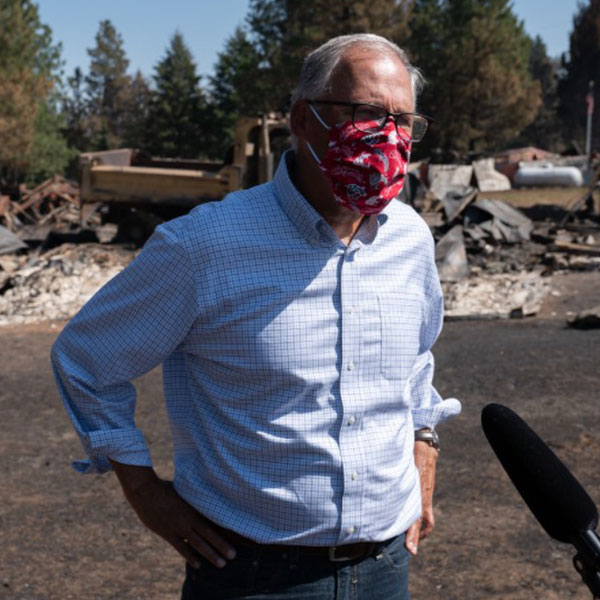Washington Gov. Jay Inslee declared a drought emergency for nearly the entire state Wednesday, attributing the severe weather to climate change.
The declaration established a ban on outdoor burning. With some water use already curtailed weeks earlier, no new curtailments were announced, although state officials did not rule out additional actions in the future.
The measure also sent the state’s Office of Financial Management scrambling to find money to help local governments and boards buy or divert water or tackle other heat mitigation measures.
The declaration will speed up processing for emergency drought permits and allow temporary transfers of water rights. Washington’s available water supplies are expected to be 75% less than normal.
The cities of Seattle, Tacoma and Everett are not included in the drought emergency because they have significant amounts of stored water.
Inslee and several other state officials discussed the declaration Wednesday at a press conference in Olympia.
“Our state is under attack from the combined effects of climate change,” Inslee said.
“This year’s drought came as a surprise to many of us. … We’ve had our second driest spring since 1895,” said Laura Watson, director of Washington’s Department of Ecology.
State climatologist Nick Bond said statewide precipitation is six inches so far this year, five inches below average. Above average temperatures are predicted through September with below average rainfall.
Inslee, Washington Lands Commissioner Hilary Franz and Department of Agriculture Director Derek Sandison said 91 Washingtonians died during a record heat wave last month, and five major wildfires have flared up in the past seven days. So far in 2021, Washington has suffered roughly 900 wildfires burning about 140,000 acres, which almost equals the total for 2019.

“What we experienced in the last few weeks is a preview of life to come. … We don’t have enough resource to keep up with the catastrophic fires that we face,” Franz said.
Water temperatures in the lower Yakima, Okanagan and Snake rivers have reached levels lethal to some fish, including threatened salmon species. Sandison said the drought conditions have led to a major decrease in berry and spring wheat yields and a 90% decline in shellfish harvesting.
So far, the state has identified about $300,000 available to be distributed to communities and public agencies for drought relief through the state’s Department of Commerce. In 2019, the state spent $600,000 for the same measures. Franz said $300,000 will not be enough for this year, but state officials did not have a figure calculated for Washington’s predicted needs in 2021. “We’re scrubbing some cash drawers to find it,” Inslee said.
Inslee and others blamed climate change for the heat wave, drought and wildfires. “The core problem is carbon pollution,” he said. He said measures such as a recent cap-and-trade bill and new low-carbon vehicle fuel standards are a way of attacking the heat and drought at their sources. (See Washington Becomes 2nd State to Adopt Cap-and-trade.)
The governor said his office is considering other anti-carbon measures, but added he is not yet prepared to publicly discuss them.



